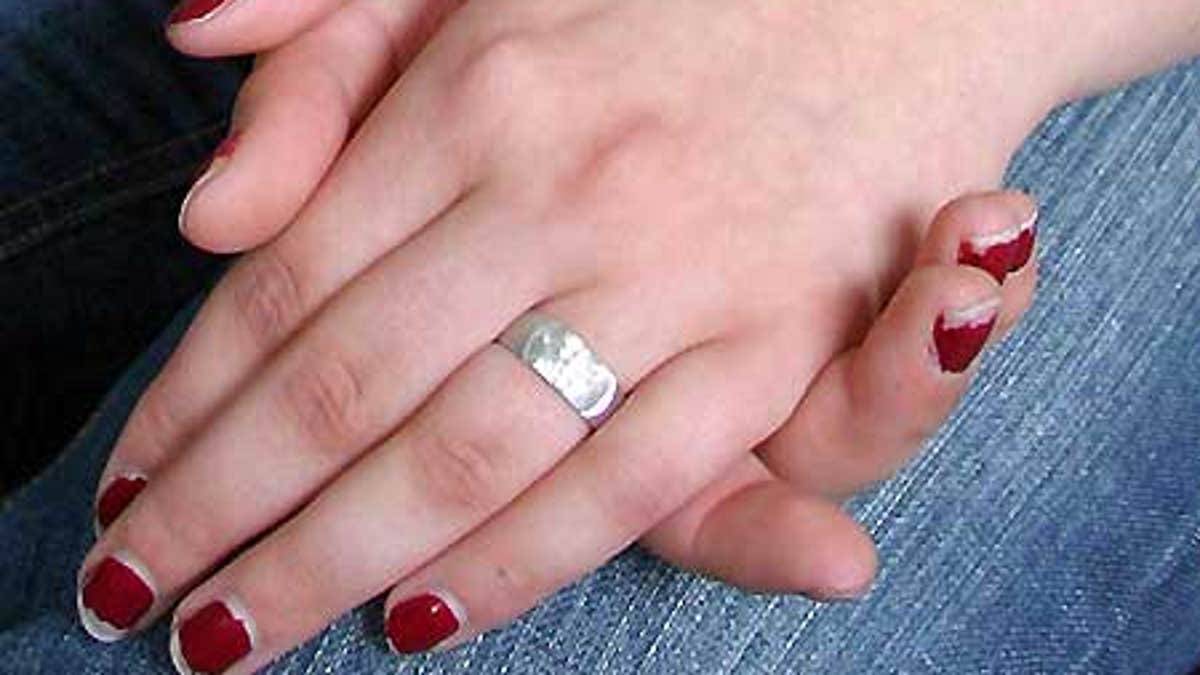
A teenaged girl wears a purity ring representing her pledge to remain celibate until marriage. (AP)
Religious teens lose their virginity later than those who are not religious — waiting on average three years longer than their peers, a recent study reported.
Janet Rosenbaum, a post doctoral fellow at Johns Hopkins Bloomberg School of Public Health, wrote in this month's issue of "Pediatrics" that those with strong religious backgrounds became sexually active at about 21 on average —regardless if they took a pledge to remain a virgin until marriage.
Using data from the National Longitudinal Study of Adolescent Health, carried out in 1995 and 1996, Rosenbaum followed up with 934 from middle and high school students around the country who never had sex. Some students had taken a virginity pledge and others had not.
Rosenbaum's study showed that making a virginity pledge doesn't play a role any sexual behavior because teenagers who take a pledge are just as likely to have premarital sex as those who do not promise abstinence. The study also revealed that those who took virginity pledges where less likely to use condoms that non-pledgers, she said.
Rosenbaum told FOXNews.com she compared apples to apples. "The behavior of teenagers who have never been to church before is pretty irrelevant when understanding the behavior virginity pledgers," she said.
Overall, religious students, regardless of whether they take virginity pledges, are more conservative than their non-religious peers. When compared against national averages, "they are having sex an average of about three years later than the average American," Rosenbaum said.
"It is something that I think can be looked on as encouraging," she said. "Kids who are choosing to be religious are also choosing to abstain."
Of those sampled, almost 60 percent had sex and more than 50 percent had oral sex five years later, and more than 80 percent of those who had taken virginity pledges had forgotten they ever did so.
Both groups had about the same number of sexually transmitted diseases as well and had, on average, three sexual partners. Teens who took the pledge had 0.1 fewer partners, on average.
Unlike previous studies on the subject, Rosenbaum told FOXNews.com that her sample only included religious students. Those who took virginity pledges were twice as likely as those who did not to be Born Again Christians.
"The past studies actually compared virginity pledgers to the general population and they relied on statistical adjustments in order to correct for the differences between the tow groups. For a lot of statistical reasons that's not good practice but its one that's very common in social sciences," Rosenbaum said.
Her study also only looked at teens who were unmarried five years after taking virginity pledges, now ages 20 to 23. "The married are out of the picture, so they're not as interesting," she said.
While conducting her research, Rosenbaum said she corresponded with one of the founders of the virginity pledge movement, and was surprised to learn that even though the movement promoted abstinence, feelings on birth control and education varied.
"Teaching birth control in schools is actually not at all controversial," she said, citing a study that showed over 90 percent of parents thought schools should teach about birth control. "Even religious parents," she said.
"It's really vital for kids to learn accurate and comprehensive information about birth control, including how to use condoms in school," Rosenbaum said. "But on the other hand, schools can't be doing it all. Parents have to be teaching their kids about sex."
